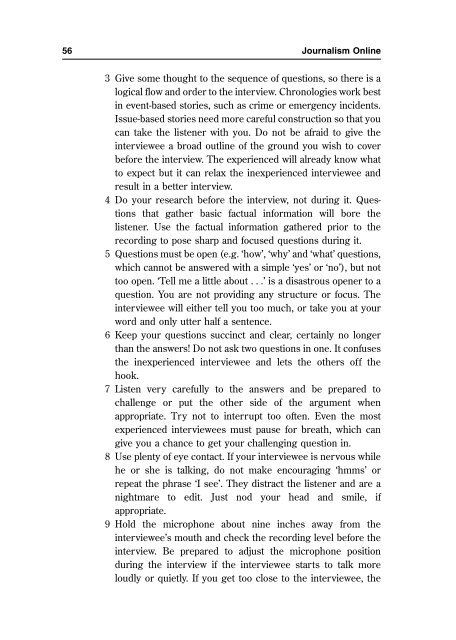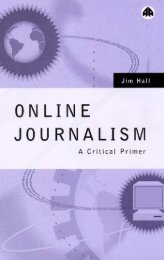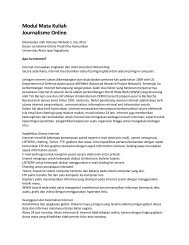1What is online journalism? - Ayo Menulis FISIP UAJY
1What is online journalism? - Ayo Menulis FISIP UAJY
1What is online journalism? - Ayo Menulis FISIP UAJY
Create successful ePaper yourself
Turn your PDF publications into a flip-book with our unique Google optimized e-Paper software.
56 Journal<strong>is</strong>m Online<br />
3 Give some thought to the sequence of questions, so there <strong>is</strong> a<br />
logical flow and order to the interview. Chronologies work best<br />
in event-based stories, such as crime or emergency incidents.<br />
Issue-based stories need more careful construction so that you<br />
can take the l<strong>is</strong>tener with you. Do not be afraid to give the<br />
interviewee a broad outline of the ground you w<strong>is</strong>h to cover<br />
before the interview. The experienced will already know what<br />
to expect but it can relax the inexperienced interviewee and<br />
result in a better interview.<br />
4 Do your research before the interview, not during it. Questions<br />
that gather basic factual information will bore the<br />
l<strong>is</strong>tener. Use the factual information gathered prior to the<br />
recording to pose sharp and focused questions during it.<br />
5 Questions must be open (e.g. ‘how’, ‘why’ and ‘what’ questions,<br />
which cannot be answered with a simple ‘yes’ or ‘no’), but not<br />
too open. ‘Tell me a little about . . .’ <strong>is</strong> a d<strong>is</strong>astrous opener to a<br />
question. You are not providing any structure or focus. The<br />
interviewee will either tell you too much, or take you at your<br />
word and only utter half a sentence.<br />
6 Keep your questions succinct and clear, certainly no longer<br />
than the answers! Do not ask two questions in one. It confuses<br />
the inexperienced interviewee and lets the others off the<br />
hook.<br />
7 L<strong>is</strong>ten very carefully to the answers and be prepared to<br />
challenge or put the other side of the argument when<br />
appropriate. Try not to interrupt too often. Even the most<br />
experienced interviewees must pause for breath, which can<br />
give you a chance to get your challenging question in.<br />
8 Use plenty of eye contact. If your interviewee <strong>is</strong> nervous while<br />
he or she <strong>is</strong> talking, do not make encouraging ‘hmms’ or<br />
repeat the phrase ‘I see’. They d<strong>is</strong>tract the l<strong>is</strong>tener and are a<br />
nightmare to edit. Just nod your head and smile, if<br />
appropriate.<br />
9 Hold the microphone about nine inches away from the<br />
interviewee’s mouth and check the recording level before the<br />
interview. Be prepared to adjust the microphone position<br />
during the interview if the interviewee starts to talk more<br />
loudly or quietly. If you get too close to the interviewee, the
















